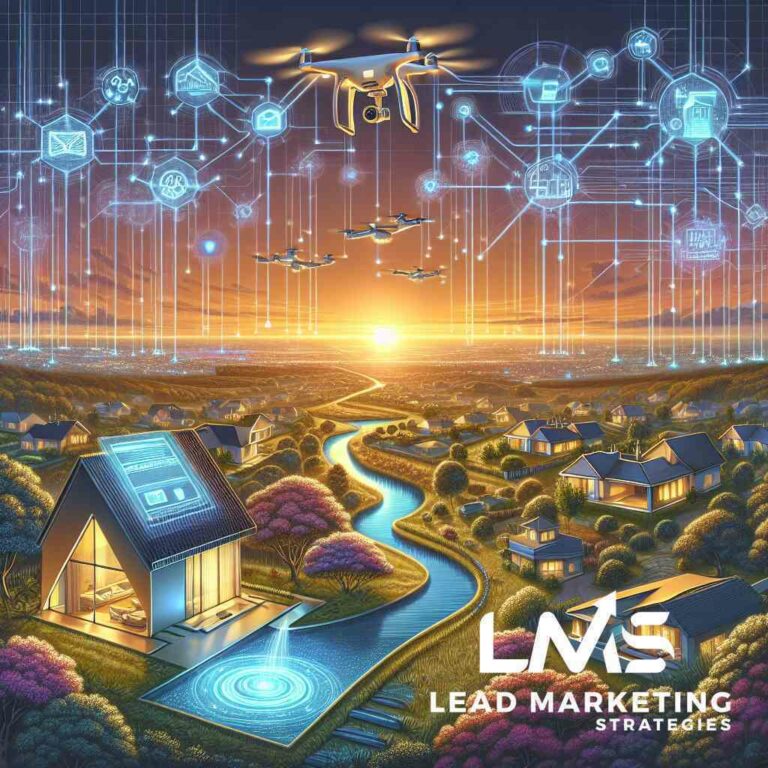Unveiling the Dynamic World of Real Estate PPC Advertising
Introduction to Real Estate PPC
In today’s competitive market, real estate PPC (Pay Per Click) advertising has emerged as a vital component of digital marketing strategies for real estate professionals. By leveraging targeted ads, real estate agents can enhance their visibility, ensuring their listings reach prospective buyers and sellers effectively. The beauty of Pay Per Click (PPC) advertising lies in its ability to provide measurable results quickly, allowing marketers to invest in ads that yield the highest returns strategically. This approach prompted many real estate businesses to embrace PPC as a catalyst for growth.
Understanding the nuances of real estate PPC is paramount for maximizing its potential. This form of digital advertising enables realtors to appear prominently in search engine results, thereby attracting potential clients actively seeking property solutions. As a critical aspect of real estate marketing, PPC campaigns can be tailored to align with specific business goals, providing a personalized experience to potential buyers and sellers. By becoming proficient in handling PPC, real estate professionals can gain a competitive edge in a crowded market.
Why PPC is Crucial for Real Estate Success
Real estate continues to be a highly competitive industry where visibility and timing are crucial. Implementing real estate PPC ad copywriting as part of a broader strategy can provide a significant advantage by placing property listings in front of an audience with genuine purchasing intent. It’s a tool that offers flexible budgeting options and precise control over advertising expenditures, making cost management feasible while ensuring maximum visibility.
Through PPC, advertisers can instantly monitor ad performance, allowing for real-time adjustments to campaigns. This instant feedback loop helps in enhancing the effectiveness of each campaign by refining targeting strategies and ad copy. Furthermore, the integration of dynamic ads amplifies the impact of PPC advertising, ensuring properties are showcased in visually appealing formats that capture potential clients’ attention, thereby facilitating faster sales cycles.
Evolution of Real Estate Digital Marketing
The landscape of real estate digital marketing has transformed dramatically over the years, evolving from simple online listings to highly targeted advertising strategies. This evolution has been driven by significant advancements in technology, such as AI and machine learning, which have introduced intelligent targeting and data analytics capabilities. Today, real estate professionals leverage platforms like Google Ads and Facebook to launch sophisticated campaigns tailored to specific demographics.
A rise in the utilization of mobile devices for property searches has also accompanied the shift towards real estate digital advertising trends. As a result, mobile optimization in property digital ads has become imperative. Modern digital marketing strategies emphasize creating seamless experiences across both web and mobile platforms to effectively engage today’s tech-savvy consumers. The trend towards cross-channel marketing in real estate continues to grow, facilitating a more holistic approach to capturing the attention of potential clients across multiple touchpoints.
Harnessing the Power of Data in Real Estate Advertising
Data-Driven Real Estate Marketing Strategies
In the modern age of digital advertising, embracing data-driven real estate PPC strategies has become indispensable for real estate professionals seeking success. By leveraging comprehensive data analytics, agents can uncover actionable insights, enabling them to craft highly targeted ads that resonate with potential buyers and sellers. This data-centric approach ensures that marketing efforts are not just a shot in the dark but a precise strategy engineered for success, optimizing every dollar spent. Consequently, real estate agents can focus their efforts on the most promising leads, thereby driving conversions and enhancing their bottom line.
To effectively manage data-driven strategies, real estate professionals often rely on advanced tools and platforms. These digital solutions facilitate real-time monitoring and adjustments, empowering marketers to swiftly adapt to market shifts and emerging trends. Additionally, integrating customer relationship management (CRM) systems with PPC campaigns provides a more holistic view of client interactions, spotlighting opportunities for nurturing relationships and increasing ROI. Ultimately, the marriage of data analysis and real estate marketing propels firms towards sustained growth and competitive advantage in an ever-evolving marketplace.Lead Marketing Strategies
Predictive Analytics in Real Estate PPC
The adoption of predictive analytics in real estate PPC advertising represents a major leap forward for marketing efficacy. By utilizing statistical algorithms and machine learning techniques, predictive analytics enables marketers to forecast future trends based on historical data, allowing them to anticipate buyer behavior and preferences. This foresight empowers real estate agents to hone their ad campaigns, ensuring they capture the attention of their intended audience at the perfect moment.
Moreover, predictive analytics is invaluable in optimizing bidding strategies, budgeting, and timing. By predicting periods of high demand, real estate professionals can allocate resources more efficiently to capitalize on these windows of opportunity. This proactive approach not only improves ad performance but also minimizes wasteful expenditures, thereby enhancing overall campaign profitability. Organizations that integrate predictive analytics into their digital advertising in real estate are better equipped to navigate the market’s complexities and remain ahead of the competition. See more on Explore Real Estate PPC Strategies for Ultimate Success.
Building Effective Keyword Strategies
Crafting a robust keyword strategy is fundamental to any successful real estate PPC advertising endeavor. Effective keyword strategies focus on long-tail keywords tailored to the specific needs and intentions of potential clients searching online. These terms often yield higher conversion rates, as they attract users who are further along in the purchasing process and actively seeking the right property solutions. By aligning these search terms with business objectives, real estate agents can deliver content that speaks directly to their audience’s needs.
Moreover, incorporating geographic qualifiers in keyword strategies can significantly enhance targeting precision. Focusing on hyper-local phrases ensures that ads reach users searching for properties in specific neighborhoods or cities, aligning with the agency’s service areas. This strategy not only bolsters visibility but also cultivates a localized brand presence, crucial for the real estate marketing near New York and beyond.
Analyzing competitors’ keyword strategies also delivers valuable insights, enabling real estate professionals to refine their approaches and outmaneuver rivals in a crowded digital landscape. Through continuous refinement and adaptation of keyword techniques, agents can maintain optimal search engine performance, securing a steady influx of quality leads eager to engage.
Innovations and Automation Revolutionizing Property Advertising
The Rise of Property Advertising Automation
The advancement of property advertising automation advancements has marked a transformative phase in the realm of real estate marketing. Today’s real estate professionals increasingly rely on automated tools to streamline and enhance their advertising efforts. Automation enables realtors to manage campaigns efficiently, track performance seamlessly, and adjust bids in real-time without manual intervention, leading to optimal outcomes. This shift not only reduces the manpower required but also amplifies scalability, making it feasible to run multiple campaigns concurrently with ease. Consequently, real estate firms can focus their resources on strategy refinement and lead nurturing.
Moreover, automation allows for comprehensive data collection and analysis, thereby informing strategic decisions. These insights are pivotal in tailoring marketing efforts to meet evolving consumer preferences and market dynamics. Through automation, agents can effortlessly implement real-time personalization tactics, ensuring that potential buyers are exposed to ads that resonate with their unique needs and preferences. Consequently, adopting automation in property advertising propels agencies toward unmatched efficiency and effectiveness, giving them a strategic edge over competitors.
AI in Real Estate Advertising: A Game Changer
The integration of artificial intelligence marks a significant leap in the evolution of AI impacts on real estate advertising. AI-driven algorithms allow marketers to analyze vast datasets swiftly, identify trends, and predict buyer behavior with remarkable precision. This capability empowers real estate professionals to craft hyper-personalized ad experiences that align perfectly with the desires of prospective clients, thus enhancing the likelihood of conversion. Check out What Defines Realtor Client Acquisition Near New York.
AI’s role extends beyond data analysis as it actively transforms ad creation and deployment. Automated tools powered by AI can generate creative ad copy and design elements, ensuring that advertisements are not only effective but also aesthetically appealing. This creative dynamism enriches user engagement, drawing potential buyers into immersive property experiences. Furthermore, AI enhances targeting accuracy, helping marketers reach the most lucrative audience segments, thus maximizing the return on ad spend. Consequently, AI serves as an indispensable ally in the modern real estate advertising landscape, boosting both operational efficiency and campaign success.
Dynamic Ads for Real Estate Listings
The advent of dynamic real estate ad listings has revolutionized the way properties are showcased. Unlike static advertisements, dynamic ads adapt content in real-time based on user interactions and preferences, offering a tailored browsing experience. This flexibility ensures that potential buyers are presented with listings that match their specific criteria, such as location, price range, and property type, thereby enhancing engagement and interest.
Dynamic ads leverage machine learning to determine the most effective elements for inclusion, ranging from images and video tours to detailed descriptions. Such personalized approaches to advertising significantly increase click-through rates by resonating with the viewer’s current needs and desires. Additionally, dynamic ads enable realtors to highlight special features or promotions, such as open houses or price reductions, directly to interested buyers.
By incorporating this innovative advertisement strategy, real estate professionals can achieve higher engagement rates and improve lead quality. The capability of dynamic ads to foster meaningful interactions with potential clients establishes them as a pivotal tool in real estate PPC campaigns, aligning well with contemporary marketing demands.

Optimizing Real Estate PPC for Maximum Impact
Conversion Rate Optimization in Real Estate
Achieving a high conversion rate in real estate PPC requires strategic fine-tuning to entice potential buyers effectively. Conversion optimization for real estate PPC focuses on harnessing analytics to understand user behavior patterns and ad interactions. By employing conversion optimization for real estate PPC, real estate agencies can tailor landing pages that complement ad promises, offering intuitive and immersive experiences. Furthermore, A/B testing different ad variations and landing page designs is crucial to discerning the most persuasive elements. As a result, real estate agents can refine their approaches, honing in on messaging that resonates, thereby maximizing conversion potential and bolstering the success of their marketing efforts.
Mobile Optimization in Real Estate PPC
With the increase in mobile searches for properties, ensuring ads are tailored for mobile platforms is no longer optional but essential. Mobile optimization in real estate PPC advertising involves creating ads that are responsive and seamlessly adaptable to various screen sizes. This includes implementing fast-loading times and mobile-friendly interfaces that facilitate effortless navigation for users on the go. Adopting mobile optimization in property digital ads enhances user experiences, drawing in clients who search predominantly on mobile devices. It is essential to prioritize clarity and relevance in ad copy, ensuring information is accessible and engaging within the limited space. Consequently, focusing on mobile optimization aligns with audience behaviors, significantly boosting visibility and engagement in today’s digital property market.
Cost-Per-Click and Budget Management
Effective PPC campaigns necessitate meticulous monitoring of cost-per-click (CPC) to ensure budget efficiency while maximizing ad exposure. Cost management demands ongoing analysis to assess ROI and necessary ad spend adjustments, a practice known as cost optimization in real estate PPC. By leveraging bidding strategies informed by historical data, real estate firms can circumvent budget excesses during peak times and capitalize on the most lucrative periods. This comprehensive approach allows agencies to allocate funds judiciously, focusing on high-performing keywords and ad sets that promise the best returns. Additionally, advanced budgeting tools offer real-time insights into campaign expenditures, empowering marketers to recalibrate strategies promptly. Mastering CPC and budget management ensures sustainable ad practices, optimizing returns while maintaining financial viability in dynamic real estate advertising landscapes.
Targeted Approaches and Personalization in Property Marketing
Geographic Targeting Effectiveness
Geographic targeting is a crucial element in optimizing real estate PPC campaigns. Leveraging geographic targeting for property PPC enables real estate professionals to zero in on specific areas, ensuring that ads are seen by those most likely to be interested in the properties being marketed. By focusing on particular neighborhoods or locales, realtors can craft messages that resonate with the unique demographics and preferences of those regions. This targeted approach not only enhances ad relevance but also boosts engagement, leading to higher conversion rates. Moreover, it allows for the creation of hyper-local campaigns that cater to city-specific needs, promoting properties to audiences primed for purchasing. Geographic targeting is instrumental in establishing a strong local presence in an ever-competitive market, giving real estate firms a distinct edge.
Understanding the regional market dynamics can further augment the effectiveness of these campaigns. By analyzing geographical data, real estate agents can predict market trends, anticipate buyer interest surges, and tailor their messaging accordingly. This strategy ensures budget allocation is used efficiently, focusing resources on the most promising markets. Geographic targeting also means real estate firms can adapt rapidly to changes in local demand, pivoting strategies to maintain relevance. Harnessing these localized insights helps realtors move beyond generic marketing, delivering precision-focused advertising that resonates deeply with prospective buyers.
Retargeting Strategies in Real Estate PPC
Retargeting is a powerful strategy in real estate PPC, giving marketers the opportunity to re-engage potential buyers who have previously interacted with their ads or websites. This approach involves subtle reminders that aim to bring hesitant buyers back into the decision-making process. Implementing effective retargeting strategies requires an understanding of user behavior and the ability to craft personalized ad experiences that resonate with past interactions.
These strategies can involve showcasing properties previously viewed by a potential client or highlighting similar listings that match their interests. Such tactics increase the likelihood of conversion by keeping real estate offerings at the forefront of the buyer’s mind. Additionally, employing segmented retargeting based on buyer intent and engagement levels can provide targeted messages tailored to each prospect’s journey, maximizing engagement.
Effectual retargeting not only rekindles buyer interest but also builds brand familiarity, reinforcing the agency’s presence within the real estate landscape. By utilizing a mix of creative, tailored messages and strategically timed ad placements, real estate professionals can significantly elevate their retargeting game, ultimately driving greater client retention and conversion rates.
Personalization: The Key to Realtor Client Acquisition
Personalization is a pivotal factor in realtor client acquisition. By utilizing personalized real estate advertising methods, agents can cultivate deeper connections with potential clients, offering tailored messages and experiences that align seamlessly with individual buyer needs. This dynamic technique leverages data analytics and insights to shape advertising strategies that capture the interests and preferences of each target demographic.
Incorporating personalized elements into PPC campaigns can make all the difference in standing out within a crowded digital environment. For instance, personalized landing pages that echo the ad content create a cohesive experience for users, increasing the likelihood of engagement. Furthermore, personalized ads that adapt to the user’s search history and engagement levels ensure that potential clients receive relevant content, promoting a sense of agency understanding their unique requirements.
As personalization becomes an expected standard in digital marketing, real estate professionals who prioritize bespoke advertising strategies will find themselves ahead. By presenting clients with bespoke solutions and demonstrating attentiveness to their needs, realtors not only enhance their chances of acquisition but also foster long-term trust and reputation, crucial components in real estate success.
The Future Frontier: Emerging Trends and Strategies
Programmatic Advertising Transformations
In the ever-evolving sphere of real estate PPC advertising, programmatic advertising transformations stand at the forefront of strategic innovation. By automating the ad buying process, programmatic advertising leverages advanced algorithms and machine learning to deliver highly-targeted property ads at scale. This method allows real estate professionals to reach precisely defined audiences across a plethora of platforms, improving efficiency and impact simultaneously. Implementing programmatic advertising empowers agents to optimize ad spends by adjusting bids in real-time based on performance data and market conditions.
The strategic implementation of programmatic advertising in property marketing enhances targeting capabilities, allowing for the seamless integration of data-driven insights into every campaign. As digital landscapes become more complex, the precision and automation offered by programmatic strategies help marketers navigate the intricacies with confidence. This advanced approach not only elevates the visibility of real estate listings but also drives higher engagement by delivering ads that resonate with user interests and behaviors, marking a significant leap forward for property marketing.
Seasonal Real Estate Advertising Techniques
Seasonal trends offer a unique opportunity to connect with potential property buyers and sellers, as distinct market needs emerge throughout the year. Implementing seasonal real estate advertising techniques requires a deep understanding of market fluctuations and consumer behavior tied to specific seasons. By aligning advertising strategies with these temporal shifts, real estate professionals can capitalize on the heightened demand, optimizing ad performance and conversion rates.
Crafting successful seasonal real estate digital campaigns involves curating messages and visuals that reflect current buyer mindsets, whether it’s promoting beachside properties in summer or cozy homes in winter. Marketers can utilize special promotions and themed content to entice audiences, creating a sense of urgency and emotional connection. By effectively harnessing seasonal events and trends, real estate agents can stay top of mind for consumers throughout the year, ultimately boosting their overall market presence.
Cross-Channel Marketing in Real Estate
In today’s multifaceted digital environment, cross-channel marketing in real estate has become essential for effectively reaching diverse audiences. This approach involves delivering cohesive and synchronized messaging across various platforms, such as social media, email, and search engines, ensuring that potential buyers experience a unified brand narrative. By crafting a consistent message, real estate firms can enhance brand recognition and trust, key drivers of successful client acquisition.
Adopting a cross-channel marketing strategy enables real estate professionals to harness the strengths of each channel while ensuring that campaigns are optimized for specific platform dynamics. This integrated approach not only caters to the preferences of tech-savvy clients but also maximizes reach and engagement by eliminating communication silos. Through strategic cross-channel efforts, agents can develop comprehensive marketing plans that drive sustained interest and engagement, positioning themselves advantageously in an increasingly competitive real estate market.

Conclusion: Navigating the Future of Real Estate PPC Advertising
Real Estate SEM Trends Moving Forward
Looking to the future, real estate professionals must continue to adapt to emerging real estate SEM innovations to maintain a competitive edge. As digital landscapes evolve, integrating advanced technologies such as artificial intelligence and machine learning into SEM strategies will be pivotal. These innovations promise to refine targeting capabilities, boost engagement, and drive conversions with increased precision. Real estate agents who invest in these groundbreaking techniques are better positioned to respond to dynamic market demands and anticipate future trends. By staying abreast of cutting-edge search engine marketing strategies, businesses can ensure sustained growth and continued success in an ever-competitive market.
As the industry advances, continuous education and adaptation are vital. Embracing trend forecasting and continuously refining marketing approaches will be essential for agents aiming to excel in this rapidly shifting environment. Collaboration with experts like Lead Marketing Strategies is one way to ensure that your agency remains aligned with the latest innovations and practices.
Maximizing Real Estate Marketing ROI
Maximizing return on investment (ROI) in real estate marketing involves a strategic blend of digital marketing techniques, data integration, and performance analytics. By leveraging real-time insights and feedback, real estate marketers can refine campaigns to enhance effectiveness and efficiency. This involves a meticulous focus on targeted keyword strategies, optimizing for cost-per-click, and continually adjusting budgets based on data-driven assessments.
To further elevate ROI, integrating personalization into advertisements helps in cultivating meaningful connections with prospective clients. Personalized messages and engaging content resonate more deeply with audiences, boosting conversion rates and brand affinity. Employing strategic cross-channel marketing practices is integral to weaving a cohesive brand narrative, ensuring that potential buyers receive a unified message across various platforms.
The Road Ahead for Digital Real Estate Platforms
The future of digital real estate platforms rests on their ability to integrate emerging technologies and adapt to shifting market trends. As real estate digital ad platforms insights reveal, these platforms serve as crucial catalysts in engaging modern home buyers and sellers. Enhanced by advancements in AI and automation, these platforms offer unparalleled opportunities for real estate firms to scale their marketing efforts while maintaining accuracy and relevance.
Emerging tools and technologies stand to revolutionize how properties are marketed online. By adopting innovative techniques and dynamic ads, firms can offer immersive and interactive property experiences that captivate audiences. Learn more about Understanding Property Analytics for Real Estate Surge. The road ahead promises exciting possibilities where digital transformation and traditional real estate prowess converge, ensuring a vibrant and competitive marketplace.
Collectively, these trends underscore the importance of a proactive approach to real estate marketing, with Lead Marketing Strategies offering the expertise to navigate this evolving landscape successfully.
Frequently Asked Questions
Question: How do Real Estate Marketing Strategies utilize AI in real estate advertising to enhance property listings’ visibility?
Answer: Real Estate Marketing Strategies leverages advanced AI impacts on real estate advertising to significantly enhance the visibility of property listings. By employing AI-driven algorithms, we analyze vast datasets to identify trends and predict buyer behavior with remarkable accuracy. This allows us to tailor hyper-personalized ad experiences that resonate with potential clients, thus increasing engagement and conversion rates. Our AI integration also extends to ad creation and deployment, where it assists in generating creative ad copy and designs that stand out to potential buyers. This not only boosts user interaction but also maximizes the return on ad spend, making our approach highly effective in real estate PPC advertising.
Question: What are the benefits of using data-driven real estate marketing strategies, according to the blog ‘What Are Key Trends in Real Estate PPC Advertising Today’?
Answer: The blog ‘What Are Key Trends in Real Estate PPC Advertising Today’ highlights the immense benefits of embracing data-driven real estate marketing strategies. At Real Estate Marketing Strategies, we harness comprehensive data analytics to unveil actionable insights, thereby crafting highly targeted ads that speak directly to potential buyers and sellers. This precision ensures advertising efforts are more strategic and effective, optimizing every marketing dollar spent. We offer tools and platforms that facilitate real-time monitoring and adjustments, enabling swift adaptation to market changes. Our integration of customer relationship management systems with PPC campaigns provides a holistic view of client interactions, which plays a crucial role in enhancing conversion rates and boosting the bottom line.
Question: How do predictive analytics play a role in maximizing the effectiveness of real estate PPC campaigns at Real Estate Marketing Strategies?
Answer: Predictive analytics in real estate PPC campaigns are a game changer at Real Estate Marketing Strategies. By utilizing statistical algorithms and machine learning techniques, we forecast future market trends based on historical data. This enables us to anticipate buyer preferences and tailor our ad campaigns accordingly, ensuring high engagement and conversion. Predictive analytics aids in optimizing bidding strategies, budgeting, and timing by accurately predicting periods of high demand. This means resources are allocated more efficiently to capitalize on these opportunities, improving campaign profitability and minimizing wasteful expenditures. Our predictive analytics integration keeps us ahead of market complexities, solidifying our standing as an industry leader in real estate PPC advertising.
Question: How do Real Estate Marketing Strategies ensure effective geographic targeting in property PPC campaigns?
Answer: Real Estate Marketing Strategies excels in geographic targeting for property PPC campaigns by honing in on specific locales to maximize ad relevance and engagement. We focus our efforts on particular neighborhoods, crafting messages that align with the unique demographics and preferences of those areas. This approach boosts interaction rates and conversion figures by reaching audiences with genuine interest in marketed properties. By analyzing geographic data, we predict market trends and buyer interest surges, ensuring our strategies remain relevant and resource-efficient. Additionally, this precision in targeting helps establish a strong local presence, giving our clients an unmistakable edge in competitive real estate markets.
Question: What role do dynamic ads for real estate listings play in enhancing ad engagement at Real Estate Marketing Strategies?
Answer: At Real Estate Marketing Strategies, dynamic ads for real estate listings play an essential role in enhancing ad engagement. These ads adjust in real-time based on user interactions and preferences, offering a tailored browsing experience that aligns with the user’s specific criteria, such as location, price range, and property type. This personalization significantly increases click-through rates as it meets individual needs and interests. By utilizing machine learning, dynamic ads determine the optimal elements, such as images and video tours to include, which resonate with the audience and drive interaction. This innovative approach to advertising ensures higher engagement rates and quality leads, making dynamic ads a pivotal tool in our real estate PPC campaigns.



